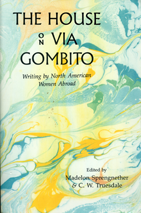In the vacant Roman villas of Boscoreale and Oplontis (lst century BCE), architectural landscapes advance and retreat across room after room. On one wall, an image of a small round temple sheathed in columns rises from the top center and is capped by teal blue sky beneath a broken pediment. On either side, columned facades retreat into sudden nothingness.
Below, between red panels, an image of a birdbath pushes forward in “real” space. It looks topped with a round of glass. Fruit and leaves stud Roman red pillars nearby. Then as if the artist’s hand gestured through real air, a sheaf of wheat waves across, asserting another vision of time and space.
At Torre Annunciata, we got off the Circumvesuvian railroad from Sorrento going toward Naples and walked to Oplontis. The villa, as I remember, was down steep steps from the modern, deserted street. Reaching it felt like waking into a vibrant fragment of another reality.
It was as if words like minnows crowded to the surface and then shaped themselves into sentences and rooms, cadences and colors. This is like the experience I often have, waking from darkness into astonishingly formed life, shaped who knows where, then appearing out of nothingness.
I have learned to enter this flow of words. Not to turn on a light. Never. When electric light touches my eyes, the words fall cloddish around me. But I need implements. So I rise and grope for blank paper and pen. Then crawl back into bed, position myself on an elbow with paper elevated beside me on a pillow. Then, closing my eyes, I call up the tiny glinting minnows and transcribe what they swim into being.
Oddly enough, much the same thing happens when I come to the computer to write for this blog. I wake in the dark, stretch into the warmth of the bed, and with eyes closed begin to invite whatever thoughts and phrases flow across the mind.
Blog is such a heavy word, suggestive of feet-stuck in-mud. Whereas, writing in the dark room, with only the light of the screen before me, and a cat warming the space behind me in the chair, I am drawn into a fluid relationship with the vast globe, taking words out of the dark and offering them into space. Not only of me, but of us all.
Writing on paper, especially a poem, can also offer this sense of being plucked out of time and set to work on transcribing something from deep and far. But poetry is highly musical and must be tested and retested through long uncertainty. Not so with this bloggy medium: though I revise as I go, a sense of the minnow school–its friendly fluidity, its aggregate shape–keeps me to a length I call manageable.
What I love most are the quick turns of the school, the glints off different fish, their sense of heading together into the water where they live and die. We’re in this together, my readers in Russia and Canada, India and Germany, Latvia and Singapore, and of course close to home. It’s humorous and energizing, liquifying and encouraging–that is, until a huge smoldering volcano not far off erupts and covers us with ash. Then we’ll be no more than ruins like Oplontis, Boscoreale, and Pompeii. Awaiting the work of far distant ages to see what they can make of us.


Leave a Reply